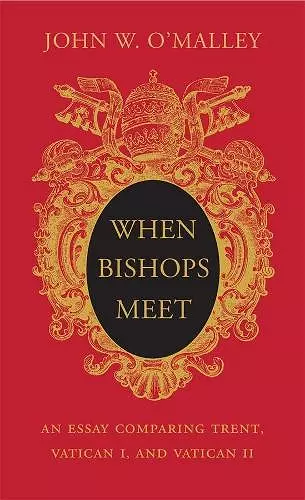When Bishops Meet
An Essay Comparing Trent, Vatican I, and Vatican II
Format:Hardback
Publisher:Harvard University Press
Published:27th Sep '19
Should be back in stock very soon

From one of our foremost church historians comes an overarching analysis of the three modern Catholic councils—an assessment of what Catholicism was and has become today.
Catholic councils are meetings of bishops. In this unprecedented comparison of the three most recent meetings, John O’Malley traverses more than 450 years of Catholic history and examines the councils’ most pressing and consistent concerns: questions of purpose, power, and relevance in a changing world. By offering new, sometimes radical, even troubling perspectives on these convocations, When Bishops Meet analyzes the evolution of the church itself.
The Catholic Church today is shaped by the historical arc starting from Trent in the sixteenth century to Vatican II. The roles of popes, the laity, theologians, and others have varied from the bishop-centered Trent, to Vatican I’s declaration of papal infallibility, to a new balance of power in the mid-twentieth century. At Trent, lay people had direct influence on proceedings. By Vatican II, their presence was token. At each gathering, fundamental issues recurred: the relationship between bishops and the papacy, the very purpose of a council, and doctrinal change. Can the teachings of the church, by definition a conservative institution, change over time?
Councils, being ecclesiastical as well as cultural institutions, have always reflected and profoundly influenced their times. Readers familiar with John O’Malley’s earlier work as well as those with no knowledge of councils will find this volume an indispensable guide for essential questions: Who is in charge of the church? What difference did the councils make, and will there be another?
This magnificent study shows how the Catholic Church has tried to reconcile faithfulness to its core identity throughout the ages. Drawing on his deeply researched studies of councils, O’Malley illuminates how the Church has moved from Trent’s definitions of what was permitted and forbidden to Vatican II’s attempt to articulate the Church’s identity in the modern world—a plea for reconciliation between humans of all faiths and convictions. -- Charles Taylor, McGill University
A master historian shows how the churches’ councils encapsulate the history of Catholicism. -- Anthony Grafton, Princeton University
In John O’Malley’s When Bishops Meet—the latest of his five books on ecumenical church councils—he compares and contrasts what he has written on the three last councils and argues that there should be a new one. This is the culmination of a great project. -- Garry Wills * New York Review of Books *
Spirited…Offers a rewarding comparison of the mechanics and mandates of the last three great Councils…O’Malley traces the historical twists and turns with great skill. -- Jonathan Wright * Catholic Herald *
When Bishops Meet comes a decade after the publication by O’Malley of separate illuminating books on the three great councils that shaped the modern Catholic Church: Trent, Vatican I, and Vatican II. Newcomers to Catholic history may profitably read the Essay without reading the three books. Those who have already read them will reap a harvest of historical reflection, encountering insight more than restatement. -- Hilmar M. Pabel * The Tablet *
[A] trenchant analysis of the changing roles of the councils’ participants and the impact that the councils had on the church and the world. * Publishers Weekly *
O'Malley is one of the greatest Catholic Church historians of the last century…A must-read for the church historian, the theologian, or anyone interested in continuity and discontinuity in the historical tradition of the church. -- Frederick J. Parella * National Catholic Reporter *
Each of these three councils has hallmark issues: Trent on justification, Vatican I on infallibility and Vatican II on the liturgy, to name a few. When Bishops Meet pushes beyond these to what O’Malley calls ‘issues-under-the-issues’: What do councils do? Do all of them do the same thing? Does church teaching change? Who participated in the councils, and who had the ultimate authority? -- Kevin Jackson * America *
[A] major monograph on all three modern Catholic ecumenical councils. In this short volume, [O’Malley] distills his learning into one highly readable essay. * Anxious Bench *
Yet again, John O’Malley has delivered a scholarly and eminently accessible work on the twists and turns of the early modern and modern Catholic Church…It yields surprisingly fresh insights, and underscores the continuity and discontinuity of contemporary Catholic thought and practice with the past in thought-provoking ways. -- Shaun Blanchard * Newman Studies Journal *
The very decision to consider the three councils together yields new insights not only into the councils themselves, but conciliar history more generally…There is much to praise in O’Malley’s new book. It will serve as refresher course for many on aspects of all three councils and will cause readers to look at them collectively in new ways. -- Salvador Ryan * Journal of Ecclesiastical History *
ISBN: 9780674988415
Dimensions: unknown
Weight: unknown
240 pages